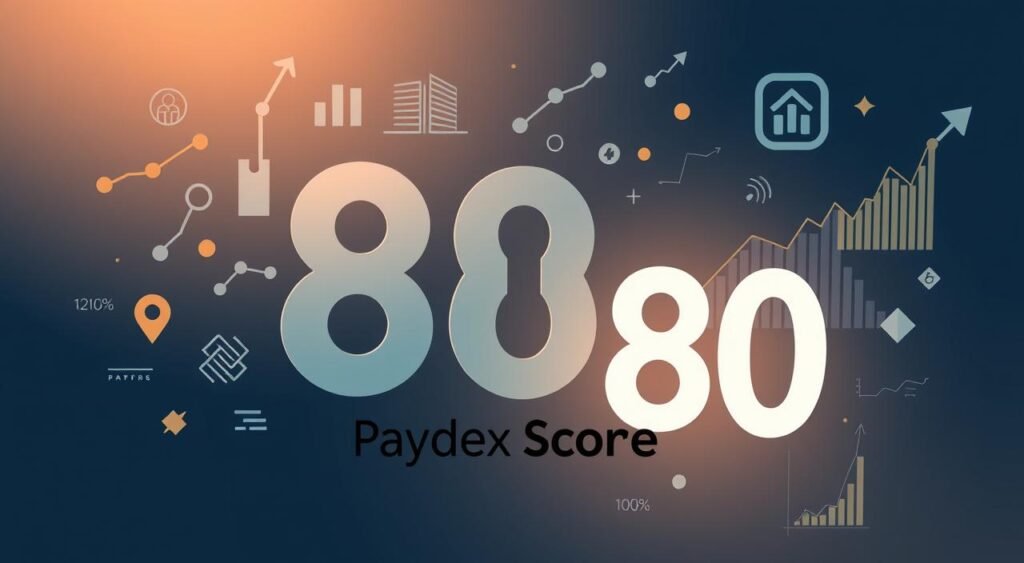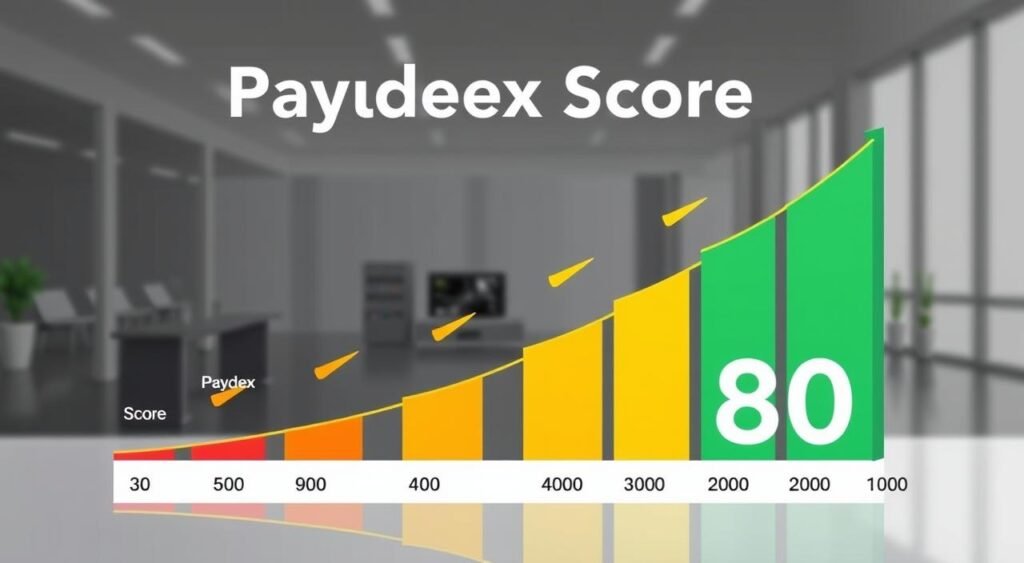Is your business’s financial reputation a mystery? Unlock the power of your Paydex Score – the key to unlocking better credit terms and business opportunities. This quick guide will demystify this crucial business credit rating and show you how it impacts your company’s financial credibility1.
The Paydex Score, developed by Dun & Bradstreet (D&B), is a vital metric that measures a company’s payment performance. It ranges from 0 to 100, with higher scores indicating a stronger payment history. Unlike personal credit scores, Paydex focuses solely on your business’s payment behavior12.
Why does this matter? A good Paydex Score can open doors to favorable supplier relationships, better credit terms, and increased financing options. It’s the financial passport that tells potential partners and lenders they can trust your business to pay on time2.
Key Takeaways
- Paydex Score ranges from 0 to 100
- Higher scores indicate better payment history
- Focuses solely on business payment behavior
- Impacts supplier relationships and credit terms
- Crucial for accessing financing options
- Developed by Dun & Bradstreet (D&B)
What Is a Paydex Score?
A Paydex score is a vital business credit rating tool developed by Dun & Bradstreet to assess a company’s financial credibility. This numerical representation ranges from 1 to 100, reflecting how promptly a business settles its bills with suppliers and creditors34.
Definition and Purpose
The Paydex score serves as a barometer for a company’s payment performance. It provides insight into the likelihood of a business paying its bills on time, with higher scores indicating better payment habits3. For instance, a score of 80 or above is considered very good, signaling that payments are made on time or earlier4.
Importance for Businesses
Your Paydex score plays a crucial role in your business operations. It influences financing decisions, insurance rates, supplier engagements, and even landlord tenancy approvals3. A strong score can open doors to favorable credit terms and partnerships, enhancing your company’s financial flexibility and growth potential.
Comparison to Personal Credit Scores
Unlike personal credit scores, the Paydex focuses exclusively on business transactions and payment history. It requires a DUNS number and at least two suppliers reporting three total payments to generate a score4. This business-specific approach provides a more accurate picture of a company’s financial behavior in the commercial world.
Understanding and managing your Paydex score is essential for maintaining strong financial credibility in the business landscape. It’s a key indicator that potential partners and creditors use to assess your company’s reliability and trustworthiness.
The Range of Paydex Scores
Paydex scores, a crucial tool in credit risk management, span from 1 to 100567. This business credit score system helps assess a company’s payment performance. The higher the score, the better the payment history.
Dun & Bradstreet categorizes Paydex scores into three risk levels:56
| Score Range | Risk Level | Payment Behavior |
|---|---|---|
| 80-100 | Low | Payments 0-30 days early |
| 50-79 | Medium | Payments up to 30 days late |
| 1-49 | High | Payments 31-120 days late |
A score of 80 is significant, indicating that a business pays its bills exactly on the due date on average5. Scores above 80 suggest early payments, while scores below 80 indicate late payments. Most businesses checking Paydex scores prefer to see a score of 80 or higher6.
https://www.youtube.com/watch?v=0rG_vgrTmkk
It’s worth noting that Paydex scores are dollar-weighted, meaning that paying off higher debts has a greater impact on the overall score5. This system encourages businesses to prioritize larger payments for better credit risk management.
To establish a Paydex score, your business needs a D-U-N-S number and at least three reported trade experiences from two trade references5. The timeframe to receive your first score varies, with more capital-intensive businesses typically establishing scores faster.
Remember, your personal credit history doesn’t affect your business’s Paydex score5. Only commercial transaction history matters, making it a pure reflection of your business’s payment performance.
How Dun & Bradstreet Calculates Paydex Scores
Dun & Bradstreet’s Paydex score is a vital tool for supplier risk assessment. This commercial credit bureau uses a unique method to calculate scores, ranging from 1 to 100, with higher scores indicating better payment performance85.
Trade Experiences and Tradelines
Your Paydex score is based on trade experiences reported by suppliers and vendors. D&B considers up to 875 trade experiences from the past two years when calculating your score4. To generate a Paydex score, you need at least two tradelines with three or more credit experiences8.
Dollar-Weighted Scoring System
The Paydex scoring system is dollar-weighted, meaning larger payments have a greater impact on your score5. This approach ensures that your payment history on significant debts carries more weight in the overall assessment.
| Score Range | Risk Level | Payment Behavior |
|---|---|---|
| 80-100 | Low | Payments 0-30 days early |
| 50-79 | Medium | Payments 2-30 days late |
| 0-49 | High | Payments 31-120 days late |
Minimum Requirements for Score Generation
To establish a Paydex score, you must obtain a D-U-N-S number and have at least three reported trade experiences from two or more trade references5. The time it takes to receive a score varies based on your business’s capital intensity and payment history.
Building a strong Paydex score typically requires at least three months of reported payment experiences and consistent on-time payments8. By maintaining a low balance and settling invoices promptly, you can improve your score over time, potentially qualifying for better financing options and attracting potential partners.
Interpreting Your Paydex Score
Understanding your Paydex score is crucial for effective credit risk management and maintaining a strong business credit rating. This score, ranging from 0 to 100, reflects your company’s financial credibility and payment habits9.
A high Paydex score indicates financial dependability and increases the likelihood of honoring commitments. Scores between 80 and 100 suggest low risk of late payments, while 50 to 79 indicate medium risk, and 0 to 49 signify high risk910.

Timely payments are fundamental to maintaining a good Paydex score. Late payments can negatively impact your score, affecting your business’s creditworthiness9. Additionally, your credit utilization ratio plays a crucial role; maintaining low credit usage can positively affect your Paydex score.
| Paydex Score Range | Risk Level | Interpretation |
|---|---|---|
| 80 – 100 | Low | Excellent payment history |
| 50 – 79 | Medium | Average payment performance |
| 0 – 49 | High | Poor payment history |
A strong Paydex score grants negotiation leverage with payment processors and vendors. It can also serve as a marketing tool to attract partners and investors, potentially leading to access to additional financial services and opportunities9.
To improve your Paydex score, focus on ensuring timely payments, managing credit use wisely, and maintaining a consistent payment record across vendors9. Remember, your Paydex score is just one aspect of your overall business credit profile, which includes other factors like the Delinquency Predictor Score and Failure Score11.
The Impact of Paydex Scores on Business Operations
Your Paydex score plays a vital role in shaping your business operations. This credit rating, ranging from 0 to 100, can significantly influence your company’s financial landscape12.
Supplier Relationships
A high Paydex score can open doors to better supplier relationships. Businesses scoring 80 often pay within 30 days of the due date, showcasing responsible financial management12. This punctuality can lead to more favorable payment terms, boosting your cash flow and operational flexibility.
Credit Terms and Financing Options
Your Paydex score directly impacts your credit terms and financing options. A strong score enhances access to better financing and helps in negotiating favorable terms12. Lenders use this score, along with other metrics like the Financial Stress Score (1,001 to 1,875) and Supplier Evaluation Risk Rating (1-9), to assess your creditworthiness13.
Business Partnerships and Contracts
In the realm of business partnerships, your Paydex score speaks volumes. It’s a key factor in vendor evaluation and credit risk management. A robust score fosters trust with partners, investors, and clients, potentially leading to more lucrative contracts12.
Remember, maintaining a high Paydex score involves having credit accounts in your business’s name, paying bills on time, and regularly reviewing credit reports. These practices not only boost your score but also strengthen your overall business operations12.
Accessing Your Paydex Score
Monitoring your business credit rating is crucial for maintaining financial credibility. As a business owner, you have several options to access your Paydex score and other important credit metrics.

Dun & Bradstreet offers a free CreditSignal account with their D-U-N-S Number, providing monthly credit report summaries14. For more comprehensive insights, you can opt for paid services. The CreditBuilder Plus program, priced at $149 per month, grants unlimited access to your Paydex score14.
Alternatively, Experian’s Business Credit Advantage subscription costs $189 annually, offering unlimited access to reports and additional features15. For a one-time check, you can purchase Experian’s CreditScore report for $39.9515.
It’s important to note that business credit reports don’t have the same privacy protections as personal credit reports. They can be accessed by anyone willing to pay the fee, without requiring your social security number14.
| Credit Bureau | Service | Price |
|---|---|---|
| Dun & Bradstreet | CreditBuilder Plus | $149/month |
| Experian | Business Credit Advantage | $189/year |
| Experian | CreditScore Report | $39.95/report |
Remember, your Paydex score ranges from 1 to 100, with higher scores indicating better payment history. A score of 80 or above is considered low risk, signifying payments made on or before the due date16. Regular monitoring of your credit score can help you maintain a strong financial profile and identify areas for improvement in your business credit rating.
Strategies to Improve Your Paydex Score
Boosting your Paydex score is crucial for effective credit risk management and enhancing your business’s financial credibility. The Paydex score, ranging from 0 to 100, reflects your company’s payment history and creditworthiness1718.
Timely Payments and Early Settlements
The key to a strong Paydex score lies in prompt payments. Settling bills within agreed terms can result in a score of 80, while paying 15 days late drops it to 7017. Aim for early payments to achieve the highest possible score of 100, which signifies a perfect payment history18.
Encouraging Suppliers to Report Payments
Your payment history only impacts your score if reported. Engage with your suppliers to ensure they report your timely payments to Dun & Bradstreet. This practice is vital for building a robust credit profile and potentially securing credit limits over $100,00017.
Monitoring and Disputing Errors
Regularly review your business credit report for accuracy. Promptly dispute any errors you find. Remember, low scores (1-49) often result from payments 90 to 120 days late, while medium scores (50-79) typically indicate payments up to 30 days late18. By maintaining a vigilant approach to your credit report, you can prevent incorrect information from negatively impacting your score.
The Role of D-U-N-S Numbers in Paydex Scoring

D-U-N-S numbers are crucial for establishing your Paydex Score with Dun & Bradstreet, a leading commercial credit bureau. These unique nine-digit identifiers are assigned to individual business entities, forming the foundation of your business credit rating19.
To obtain a Paydex Score, you must first apply for a D-U-N-S number. The process is free and typically takes up to 30 days, though expedited processing is available for a fee19. This identifier allows Dun & Bradstreet to create and maintain your business credit file, which is essential for generating your Paydex Score.
It’s important to note that each physical business location requires its own D-U-N-S number. This ensures accurate credit reporting for companies with multiple locations. By obtaining a D-U-N-S number, you’re taking a crucial step towards building a strong business credit profile, which can lead to better loan terms, insurance rates, and trade credit agreements19.
| Aspect | Details |
|---|---|
| Cost | Free (standard processing) |
| Processing Time | Up to 30 days |
| Expedited Processing | $229 for 8 business days |
| Eligibility | Businesses of any size or structure |
| Importance | Essential for Paydex Score and business credit |
Remember, your D-U-N-S number is distinct from your EIN (Employer Identification Number), which is used for tax purposes. While D-U-N-S numbers were once required for federal contracts, they’ve been replaced by UEIs through SAM.gov since April 202219. Nonetheless, they remain vital for establishing your business credit rating with Dun & Bradstreet.
Paydex Score vs. Other Business Credit Scores
Understanding your business credit rating goes beyond just knowing your Paydex score. Several other credit scores play crucial roles in credit risk management. Let’s explore how Paydex compares to other key business credit scores.
FICO SBSS Score
The FICO Small Business Scoring Service (SBSS) score is a vital metric for businesses seeking loans. This score ranges from 0 to 300, with 140 or above pre-qualifying for an SBA 7(a) loan. Many banks prefer a score of 160 or higher for optimal loan terms20.
Experian Intelliscore Plus
Experian’s Intelliscore Plus, like the Paydex score, uses a scale of 1 to 100. A good score falls within 76-100, indicating lower credit risk. This score considers factors such as payment history, credit applications, and recent collections2122.
Equifax Business Credit Risk Score
The Equifax Business Credit Risk Score ranges from 101 to 992. It evaluates factors like available credit limit, business size, and payment history. A higher score suggests lower credit risk, with 0 indicating bankruptcy21.
While each score uses different scales and factors, they all aim to assess your business’s creditworthiness. The Paydex score focuses primarily on payment history, whereas others incorporate additional elements like business size and industry risk.
| Credit Score | Range | Good Score | Key Factors |
|---|---|---|---|
| Paydex | 0-100 | 80-100 | Payment history |
| FICO SBSS | 0-300 | 160+ | Multiple business credit data points |
| Intelliscore Plus | 1-100 | 76-100 | Payment history, credit applications, collections |
| Equifax Business | 101-992 | Varies | Credit limit, business size, payment history |
To maintain a strong business credit profile, it’s essential to monitor and manage all these scores. Each provides unique insights into your company’s financial health and creditworthiness.
Common Misconceptions About Paydex Scores
When it comes to business credit ratings, many misconceptions surround Paydex scores. First, it’s crucial to understand that not every business automatically has a credit report or score23. Contrary to popular belief, simply owning a business doesn’t guarantee a credit profile; you need to take intentional steps to establish one23.
Another common myth is that all business transactions impact your Paydex score. In reality, you need at least three reported payment experiences, with one being credit-based, to generate a Paydex score24. Your payment history plays a significant role in your financial credibility, but not all vendors report to Dun & Bradstreet.
Many business owners mistakenly believe that achieving the highest Paydex score of 100 is necessary. In fact, an 80 is considered optimal, and most creditors don’t require this perfect score24. It’s also worth noting that paying bills ahead of time within discount terms doesn’t affect your Paydex score24. Instead, focus on maintaining timely payments across all your business credit scores for a comprehensive financial picture.
FAQ
What is a Paydex Score?
Why is the Paydex Score important for businesses?
How is the Paydex Score different from personal credit scores?
What is the range of Paydex Scores?
How does Dun & Bradstreet calculate Paydex Scores?
How can I interpret my Paydex Score?
How can I access my Paydex Score?
What strategies can I use to improve my Paydex Score?
What is the role of D-U-N-S Numbers in Paydex Scoring?
How does the Paydex Score compare to other business credit scores?
What are some common misconceptions about Paydex Scores?
Source Links
- PAYDEX Score: The Only Ultimate Guide You Need To Read – https://www.forbes.com/advisor/credit-score/paydex-score/
- PAYDEX Score: The Dun & Bradstreet Business Credit Rating – https://www.nav.com/business-credit-scores/dun-bradstreet-paydex/
- What Is A Paydex Score? | Bankrate – https://www.bankrate.com/credit-cards/business/what-is-paydex-score/
- D&B PAYDEX Score FAQ – Business Credit Score Guide – https://northshoreadvisory.com/business-credit/business-credit-scores/dnb-paydex-score-faqs/
- Understanding the Paydex Score – https://www.businessinsider.com/personal-finance/credit-score/what-is-paydex-score
- Paydex Score: Everything You Need to Know – https://paymentcloudinc.com/blog/paydex-score/
- What is PAYDEX Score | Gaviti – https://gaviti.com/glossary/paydex-score/
- PAYDEX Score: The Dun & Bradstreet Business Credit Rating – https://ramp.com/blog/what-is-a-paydex-score
- PAYDEX Score: The Only Ultimate Guide You Need To Read – https://www.linkedin.com/pulse/paydex-score-only-ultimate-guide-you-need-read-echeckplan-6qgze
- How to Check Your Business Credit Score: PAYDEX Score & More – https://www.creditsuite.com/blog/how-to-check-your-business-credit/?srsltid=AfmBOorYakvB_CcXWKwG7YBEf-BSlDlky6tgQR07n4U6dIXghO7dVHxx
- Understanding the Three Major Business Credit Bureaus – https://www.score.org/resource/article/understanding-three-major-business-credit-bureaus
- Paydex Scores: Your Key to Small Business Financial Success. – https://www.paycron.com/blog/unlocking-financial-success-a-comprehensive-guide-to-paydex-scores-for-small-businesses
- PAYDEX Business Credit Score: See What Yours Means – https://www.creditsuite.com/blog/decoding-the-paydex-business-credit-score/?srsltid=AfmBOor8WigjRzhmiv5dxXhPh4ynEHmZfitb2axEEOA1rZShXUBULkCu
- How to Check Business Credit Scores and Reports | Nav – https://www.nav.com/blog/how-to-check-business-credit-431017/
- How to Check Your Business Credit Score – NerdWallet – https://www.nerdwallet.com/article/small-business/how-to-check-your-business-credit-score
- Paydex Score: Breaking Down This Credit Score | Fundera – https://www.fundera.com/blog/paydex-score
- How to Get a PAYDEX Score Fast: Learn How to Build Your Score – https://www.creditsuite.com/blog/do-you-have-a-paydex-score/?srsltid=AfmBOopyQOt2v1EIyzqQ8GYGHVG1fK0VoIitt_aB-Cdhbix09KHRj4I6
- PAYDEX® Business Credit Score Guide – Huddle Business Capital – https://huddlebc.com/blog/paydex-score-guide
- DUNS Number: What It Is and How to Get One – NerdWallet – https://www.nerdwallet.com/article/small-business/duns-number
- What Is a Good Business Credit Score? | Nav – https://www.nav.com/resource/what-is-a-good-business-credit-score/
- How to Check Your Business Credit Score: PAYDEX Score & More – https://www.creditsuite.com/blog/how-to-check-your-business-credit/?srsltid=AfmBOoq0oiZ408uwhb7z0okhycItTJTcBtDWjx0H6fA3lFAXxD18JDN5
- Understanding Business Credit Scores – Credit Strong – https://www.creditstrong.com/business/business-credit-scores/
- Business Credit Bureau: 4 Misconceptions to Understand – https://www.creditsuite.com/blog/business-credit-bureau/?srsltid=AfmBOorsSSa08b0httYntJOMUd4uOSOfy4CPY6wToWvDW8gddu4d-ib_
- The 80 Paydex Score Rabbit Hole – https://www.starpointcreditsolutions.com/post/the-80-paydex-score-rabbit-hole

